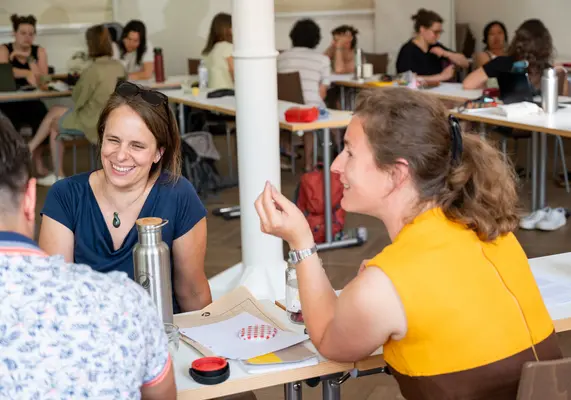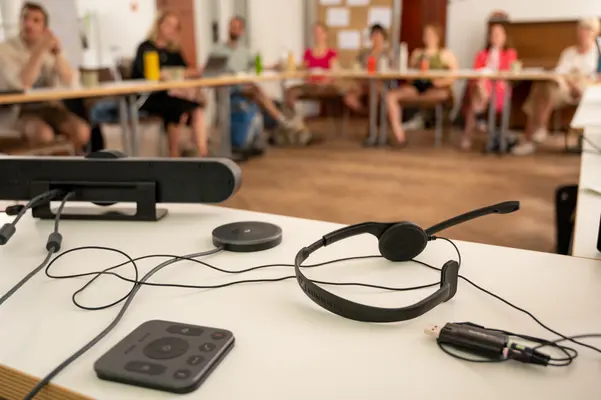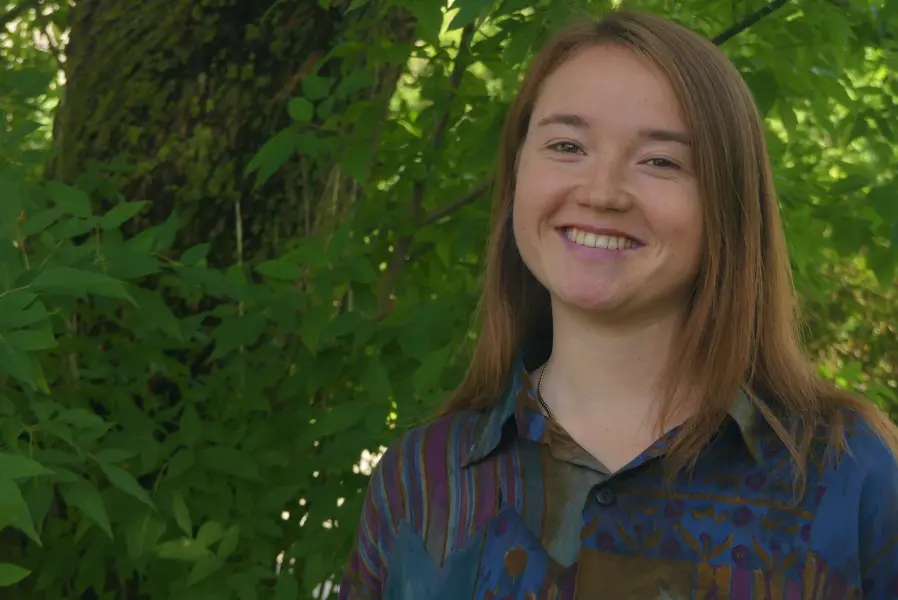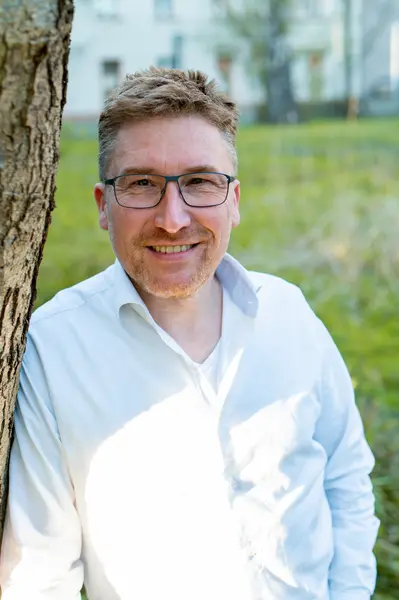Individual study contents
In the degree programme, you will learn about ESD as an effective transformative force, starting from the basics of education and sustainability. You can actively apply your new knowledge and methods right away in a practical ESD project. So that you can study flexibly, you will learn with e-learning tools, in self-study and on 2-3 weekends per semester in presence on site at the HNEE. You will learn to recognise complex interrelationships in the educational context of sustainable development, to develop your own ESD projects and to shape educational and transformation processes.
Modules per semester
In the first semester, you will acquire the theoretical foundations in the field of sustainability and educational sciences as well as (environmental) psychology in introductory modules.
In the first module, you will deal with selected aspects of sustainability. The basis for this is in particular the textbook "Man in the Global Ecosystem - An Introduction to Sustainable Development", in which a systemic understanding of sustainability is developed.
This module provides you with the basics of the terms and concepts used in educational sciences. It strengthens the understanding of education as a lifelong process and addresses the importance of education in social transformation processes. You will get to know pedagogical, didactical and methodological approaches.
New strategies and concepts for sustainability often require a change in action routines. In the module you will learn about factors influencing people's actions. It will be analysed which influences can be meaningfully changed to trigger sustainability-oriented behaviour.
In the second semester, the educational concepts ESD and Global Learning are central topics. You will further develop pedagogical and didactical competences in order to be able to develop your own educational concepts in a technically sound way. You start your 3-semester ESD practice project with the module Project Planning.
Building on the basics of the modules "Introduction to Educational Sciences" and "Introduction to Sustainable Development", this module deals intensively with the topic of Education for Sustainable Development. You will be enabled to develop, implement and evaluate your own ESD concepts.
Global learning as an educational concept addresses worldwide developments and related problems, risks and opportunities. The focus is on global connections and the effects of ecological, economic and social processes on the environment and society. They deepen the basics of Global Learning addressed in the module "Introduction to Education for Sustainable Development".
Over three semesters, you will implement a practical ESD project, ideally with a cooperation partner. With professional supervision, you will deepen your knowledge of project management. In the project, you can work on a problem for your own institution or set up a reference project with new partners. The first step is the development of a project concept.
In the third semester you will learn to create spatial references in order to be able to interact with ESD in regions and networks. You will get to know the actors of ESD in various fields of work and as possible cooperation partners.
In sub-module 6b of the ESD practice project, you will implement your project. Based on your acquired knowledge, you will use project management methods to control this process. You will deal with the basics of evaluation and learn to manage challenges that arise in the project by making targeted decisions.
This module teaches how ESD can contribute to sustainable development in rural or urban areas. You will learn about potentials and framework conditions for a practical anchoring of ESD offers in the context of different regional development approaches.
In this module you will deal with the understanding of educational landscapes. Their management is considered from the perspective of the networking of different educational offers.
In the fourth semester you complete your ESD practice project. In the module Education Marketing you learn how to reach your target group with your offer. At the same time, you will prepare for your Master's thesis in the Research Methods module.
In the last sub-module of the ESD practice project, the project implemented in the 3rd semester is evaluated, critically reflected upon and you review the achievement of the project goals set in the planning. The focus of this phase in the project is writing the final project report.
You will learn how to make ESD education offers visible to a target group and how to design suitable advertising material. Strategies of education marketing will be presented and discussed. In particular, current trends in digitalisation and social media platforms will be addressed.
In this module, you will prepare for the Master's thesis and deal with the basics of quantitative and qualitative research methods. You will independently develop a research design for a scientific investigation.
You work on your Master's thesis. Upon completion of the programme, you will receive the degree "Master of Arts".
Now you complete your studies with the Master's thesis! In doing so, you will use the knowledge and skills acquired during your studies at a scientific level. In the colloquium, you discuss your research question for the Master's thesis.
FAQ study contents
Each module begins with an online kick-off meeting at which information is provided about the module objectives, content and procedure. In addition, as a student you will already receive initial information on the examination performance and assignments for the subsequent self-study phase. For each module, you will receive learning materials, such as teaching letters, books, online literature or learning videos. After the first self-study phase, there is usually a presence weekend in Eberswalde, where the findings, tasks and questions from the self-study phase are discussed. Participation in the attendance weekends is not compulsory. However, the attendance weekends offer the opportunity for exchange and consolidation. The times are based on the following framework:
Friday: 14:30 - 20:15
Saturday: 8:30 - 20:15
Sunday: 8:30 - 13:15
In addition to attending on site, students can also (passively) participate online. This is an additional offer which does not fully cover all course contents (e.g. exercises). We therefore recommend on-site participation.
After the attendance weekend, the second self-study phase takes place for consolidation and preparation of the examination performance.
All information on the individual phases of the modules will be made available to you on the Moodle learning platform.
You should plan on an average of about 20h per week. There will be peaks before exams or homework deadlines.
You will acquire 6 ECTS per module. One ECTS corresponds to 30 working hours, so you should plan for about 180 hours per module.
The time required may be reduced by the synergy of work and study, e.g. by planning and implementing an ESD practice project in your own professional environment.
To make it easier for you to study and combine your studies with your professional activities, we spread out the workload of the individual modules over the entire semester. The self-study phases and the provision of various analogue and digital offerings allow you to organise your studies more flexibly in terms of time and space. However, weeks or even months of downtime are unfavourable for the success of your studies.
The module kick-off events as well as subject-specific lectures and exam-relevant content at the face-to-face and online events are recorded wherever possible. If it is not possible to attend the fixed dates due to illness, appointments, etc., you therefore usually have the option of viewing these subsequently on the Moodle learning platform.
Depending on the module, the examination can be an (online) written exam, an oral (online) exam or a written format, for example a term paper or a scientific poster. Which concrete form of examination is provided for in the respective module can be found in the study and examination regulations.
The dates for the kick-off meetings, attendance weekends and exams are announced early on the programme website, about 4-6 months in advance, so that you can plan for them. You can get a quick overview of the dates and deadlines for the current modules on the Moodle learning platform.
There are no fixed "holiday periods" as with full-time face-to-face study. As a rule, no study-related dates will take place in the months of March and September. In addition, the summer holiday periods, the time over Christmas and special holiday constellations are taken into account when planning the semester. No attendance weekends or online seminars are planned during these times.
The module Project Planning, Project Implementation and Project Comp letion extends over three semesters and creates the space to plan your own (project) idea in the sense of Education for Sustainable Development, to put it into practice and to evaluate it already during your studies. In doing so, you can directly apply what you have learned so far from the other modules and deepen your knowledge of project management. You can choose a project to be carried out within the framework of your professional activity. Alternatively, independent projects, e.g. in the context of an honorary position or civil society commitment, and projects at the HNEE are also possible. The module is divided into three sub-modules (project planning, project implementation and project completion) and begins in the second semester. In the course of the sub-modules, you will first develop and plan an ESD practice project alone or as a team (sub-module project planning). A suitable project partner must be found for the project. These can be employers, companies, organisations/institutes or other cooperation partners where the project can be implemented. They should deal with the same topic and/or have the necessary resources for the project.
Exemplary student projects include
- the organisation of network meetings on selected sustainability topics such as a student conference;
- ESD education offers for schools, e.g. within the framework of project days.e.g. as part of project days;
- ESD seminars for people on current topics in our society, e.g. social justice, alternative forms of housing, exploring one's own possibilities for action.
The projects are implemented in the third semester in the sub-module Project Implementation. The implementation phase is accompanied by online consultations where lessons learned are exchanged and you can receive feedback from the lecturers. In the fourth semester, the last sub-module focuses on project evaluation and project completion.
An examination must be taken at the end of each sub-module.
I want to engage with people and show how to live sustainably and make the world a little better. When I found the Master BNT, I knew I needed the knowledge and the degree to make a difference in the field of sustainability.

Jasmin Junghans
Student, Education - Sustainability - Transformation






